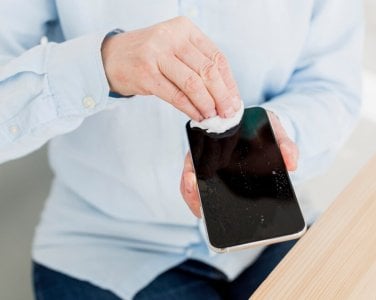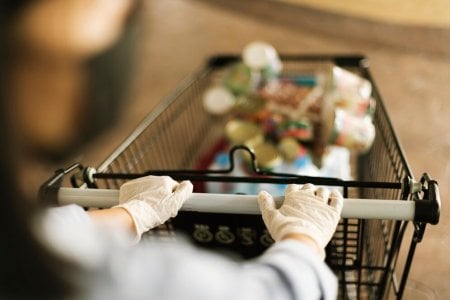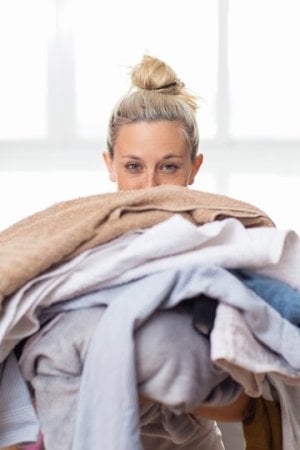You won't believe the dirtiest places you're touching each day!
By
- Replies 9
We all know that dirty places like toilet seats and garbage cans can harbour lots of germs. But you may be shocked to learn that some of the most bacteria-ridden items are ones you interact with multiple times a day – like your phone, the shopping trolley at the grocery store, and even that pile of 'clean' laundry on your bedroom floor!
Keep reading for a revealing look at the germiest places you touch regularly – and tips to protect yourself from the hidden dangers. Trust us, you'll want to thoroughly wash your hands after reading this!
Mobile Phones - A Cesspool in Your Pocket
That tiny computer in your pocket may seem harmless, but it's actually crawling with more bacteria than a toilet seat! One study found mobile phones can carry 10 times more bacteria than a typical toilet.
One big reason phones get so filthy is that we touch them nearly 100 times per day on average. All that contact gives bacteria like Staphylococcus plenty of chances to spread. Staph bacteria can cause nasty skin infections, pneumonia, and blood poisoning if it gets out of control.
Phones also gather bacteria in warm, moist places like your pockets and purse. This cosy environment allows them to really flourish and multiply. So if you use your phone on the toilet, it could be harbouring faecal bacteria too. Gross!
Washing hands frequently and keeping phones away from bathrooms can help. But giving your phone a wipe down with a disinfectant is never a bad idea.
Shopping Trolleys - Bacteria on Wheels
Who would have thought those handy trolleys at the grocery store could be crawling with germs - even more than the store's toilet! But one study found over 75% of trolleys had faecal bacteria lurking on the handles. The main culprit is people failing to wash their hands properly after using the bathroom. Then they grab a cart and leave a trace of E.coli or other gut bacteria behind.
Exposure to faecal bacteria can cause digestive nightmares like diarrhoea, vomiting, and stomach cramps. And it's especially risky for young children sitting in the trolley basket touching handles. Yikes!
So before you casually grab that cart, consider giving the handle a wipe down first or wearing some gloves.
Laundry - Still Dirty After 'Cleaning'
You stuff dirty clothes in the washing machine, they come out looking and smelling fresh. But research shows your laundry may still be harbouring hidden viruses after washing, like hepatitis A, adenovirus, and rotavirus.
The reason is these stubborn viruses can survive the wash cycle. Then when you fold 'clean' clothes, the viruses cling to your hands ready to infect the next thing you touch – like your phone!
The solution is to wash clothes on the hottest setting possible. High heat helps kill viruses and bacteria that make it through the wash. Then be sure to wash your hands immediately after handling wet laundry.
The moral of the story - your world is filled with unexpected bacteria traps! But a few smart precautions like hand washing and disinfecting can help protect you and your family from the germs lurking on everyday items. After all, there's no need to live in a sterile bubble – just use common sense.

What other unexpected dirty items have you discovered lurking around? Share your stories in the comments!
Keep reading for a revealing look at the germiest places you touch regularly – and tips to protect yourself from the hidden dangers. Trust us, you'll want to thoroughly wash your hands after reading this!
Mobile Phones - A Cesspool in Your Pocket
That tiny computer in your pocket may seem harmless, but it's actually crawling with more bacteria than a toilet seat! One study found mobile phones can carry 10 times more bacteria than a typical toilet.
One big reason phones get so filthy is that we touch them nearly 100 times per day on average. All that contact gives bacteria like Staphylococcus plenty of chances to spread. Staph bacteria can cause nasty skin infections, pneumonia, and blood poisoning if it gets out of control.
Phones also gather bacteria in warm, moist places like your pockets and purse. This cosy environment allows them to really flourish and multiply. So if you use your phone on the toilet, it could be harbouring faecal bacteria too. Gross!
Washing hands frequently and keeping phones away from bathrooms can help. But giving your phone a wipe down with a disinfectant is never a bad idea.
Shopping Trolleys - Bacteria on Wheels
Who would have thought those handy trolleys at the grocery store could be crawling with germs - even more than the store's toilet! But one study found over 75% of trolleys had faecal bacteria lurking on the handles. The main culprit is people failing to wash their hands properly after using the bathroom. Then they grab a cart and leave a trace of E.coli or other gut bacteria behind.
Exposure to faecal bacteria can cause digestive nightmares like diarrhoea, vomiting, and stomach cramps. And it's especially risky for young children sitting in the trolley basket touching handles. Yikes!
So before you casually grab that cart, consider giving the handle a wipe down first or wearing some gloves.
Laundry - Still Dirty After 'Cleaning'
You stuff dirty clothes in the washing machine, they come out looking and smelling fresh. But research shows your laundry may still be harbouring hidden viruses after washing, like hepatitis A, adenovirus, and rotavirus.
The reason is these stubborn viruses can survive the wash cycle. Then when you fold 'clean' clothes, the viruses cling to your hands ready to infect the next thing you touch – like your phone!
The solution is to wash clothes on the hottest setting possible. High heat helps kill viruses and bacteria that make it through the wash. Then be sure to wash your hands immediately after handling wet laundry.
The moral of the story - your world is filled with unexpected bacteria traps! But a few smart precautions like hand washing and disinfecting can help protect you and your family from the germs lurking on everyday items. After all, there's no need to live in a sterile bubble – just use common sense.
Key Takeaways
- Your phone, grocery shopping trolleys, and even your ‘clean’ laundry are among the most bacteria-loaded items you touch daily and can cause various health issues.
- Washing your hands and maintaining overall cleanliness can significantly reduce exposure to harmful bacteria.
- A wet toothbrush holder, office coffee cups and piles of laundry can harbour harmful bacteria like E. coli and Staphylococcus.
- Home, office and public areas, like shopping trolleys, phones and laundry, have more bacteria than a typical toilet seat due to the frequency of touch and lack of regular cleaning.
What other unexpected dirty items have you discovered lurking around? Share your stories in the comments!










